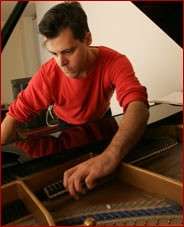|
Back
Wobblies on the East River New York
BargeMusic, Fulton Ferry Landing, Brooklyn
01/06/2011 -
“Here and Now”
Poul Ruders : Star-Prelude and Love Fugue
Frederic Rzewski: North American Ballads
John Psathas: Jettatura
John Adams: Phrygian Gates
Stephen Gosling(Piano)

S. Gosling (©E. Ratick)
For the next few months, BargeMusic is highlighting some of the best contemporary music, mainly by well-known composers, with a few more remote names. This week, three of New York’s most interesting pianists, Taka Kigawa, Stephen Beck and Stephen Gosling do separate honors. But on Saturday, the trio will come together for works by Ligeti and Stravinsky, as well as Haydn and Brahms.
Stephen Gosling was on last night, and while both audience and much of the music was Minimalist, the performance gave a maximum enjoyment. Neither clouds nor impending snow could block the view on the East River (some of the Christmas trees were still lit, and the Ice Cream Factory still has some of the best cones in town), or the aural view inside.
While his program included Ruders and Adams, the Rzewski North American Ballads showed two sides of Mr. Gosling. First, as a perfomer, and second–thanks to Rzewski, a jazz improviser who allows his players to take their licks–as an artist not afraid to take chances.
Certainly Rzewski has fearless as an active Leftists, and as a player who doesn’t relegate his music to the workingman. Yes, these four works are well known, but the “arrangements” make for entirely new works. That wasn’t entirely true in the opening Dreadful Memories, a fairly simple piece, albeit with some surprising modulations.
But the middle works were more challenging even ideological. The old IWW (Wobblies) union song, “Which Side Are You On” hides its melody between some riffing, and an endless ostinato of marching in the left hand. We know which side Rzewski is on, and Mr. Gosling played the march with gleeful ferocity.
“Down By The Riverside” is hardly martial, but the long cadenza-jazz gave Mr. Gosling time to fit in a half-dozen riverine songs. I caught Kern’s “Ol’ Man River”, Offenbach’s “Barcarolle” and two bars from American in Paris, but there were probably, more, as well as a few harmonica chords.
The end, Winnesboro Cotton Mill Blues, has some hidden ideology from the first banging chords, alternatively on the bottom white notes and bottom black notes for the segregated North Carolna Mill. Then Mr. Gosling continued with some wild tone clusters (played Cowell style with the whole arm) and some very angry chords.
The piece started more lightly with Paul Ruder’s short Star-Prelude and Love Fugue, a twisted Bach-like piece, with interweaving melodies. The New Zealand composers John Psathas composed a work around the Evil Eye and gazing. A toccata of dazzling difficulty, taken in his (considerable) stride by Mr. Gosling.
Most of the second half was taken by John Adams Phrygian Gates. If it wasn’t familiar to begin with, it sure as at the end. The minimalist repetitions are iconic, limitless, hardly mesmeric any longer, but certainly an Augean task for any player.
Mr. Gosling didn’t show the least exhaustion for any of the music. But after the Adams, he did shake his hand up and down comically to show that, yes, such music can take its toll even for the most proficient artists.
Harry Rolnick
|